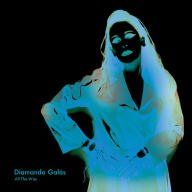Born and raised in San Diego, California, Galás was the daughter of Greek Orthodox parents and her singing was roundly discouraged, although her prowess as a classical pianist was nurtured. Ultimately, her strict upbringing resulted in a reckless, drug-fueled youth prior to her entrance into the University of California's music and visual arts program. Galás made her performing debut in 1979 at France's Festival d'Avignon, which led to an invitation to assume the lead role in composer Vinko Globokar's politically charged opera Un Jour Comme un Autre. In subsequent solo performance art pieces like Wild Women with Steak Knives and Tragouthia Apo to Aima Exon Fonos, Galás further honed her unique, window-shattering vocal style, inspired by the Schrei ("shriek") opera of German expressionism (a form employing a system of four microphones and a series of echoes and delays).
After appearing on a 1979 LP by Jim French (also featuring Henry Kaiser), Galás made her solo recorded debut in 1982 with The Litanies of Satan, a provocative work comprising a vocal adaptation of a poem by Charles Baudelaire. After the prison-themed performance piece Panoptikon (documented on a self-titled 1984 release), she began developing a trilogy of albums known collectively as Masque of the Red Death. Released independently between 1986 and 1988 as The Divine Punishment, Saint of the Pit, and You Must Be Certain of the Devil, the three records cataloged Galás' litany against the AIDS epidemic, which claimed her brother, playwright Philip-Dimitri Galás, in 1986. With 1990's The Singer, she made her first subtle advances into the realm of pop music; reprising some of the same gospel material that snaked through The Masque of the Red Death, the record also featured her covers of Willie Dixon's "Insane Asylum" and Screamin' Jay Hawkins' "I Put a Spell on You." The 1993 a cappella effort Vena Cava preceded 1994's The Sporting Life, a collaboration with former Led Zeppelin bassist John Paul Jones, consisting mostly of original compositions. A record of Galás' 1994 radio work Schrei X followed in 1996, in tandem with her first book collection, The Shit of God. She returned two years later with Malediction Prayer. The solo live recordings Serpenta Canta and Defixiones: Will and Testament, Orders from the Dead were released in November 2003, followed by another live music set, Guilty Guilty Guilty, in 2008.
While Galás accepted commissions and toured Europe and Asia over the next decade, she released no new material. She remedied that in 2017 with the release of two albums. All the Way was a collection of radical reworkings of folk, country, and jazz standards such as Thelonious Monk's "'Round Midnight" and Johnny Paycheck's psychobilly classic "Pardon Me, I've Got Someone to Kill." At Saint Thomas the Apostle Harlem was recorded at the church during the Red Bull Music Academy Festival 2016, and exclusively comprised what the artist referred to as "death songs." Sung in four languages -- Italian, German, French, and Greek -- the performances included settings of death poems by Cesare Pavese and Ferdinand Freiligrath, and covers of songs by Jacques Brel and Albert Ayler. The albums were released on Galás' own Intravenal Sound Operations label, and were followed by European and North American tours. After taking ownership of her back catalog in 2019, she made her albums available on streaming services and began reissuing them in 2020, beginning with The Litanies of Satan. She also released De-formation: Piano Variations, a 21-minute solo piano piece based on Das Fieberspital, an expressionist poem written by Georg Heym in 1912. Verses by Heym were included on the 2022 release Broken Gargoyles; in a previous form, the work was featured as a sound installation at the Kapellen Leprosarium in Hanover, Germany. ~ Jason Ankeny & Paul Simpson, Rovi


















